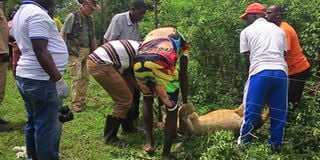Prime
Electrocuted lions: UWA probes lodge fence owner

It is alleged that the lionesses were electrocuted after two of them were found stuck in in the Irungu Hotel electric fence. PHOTOS/ COURTESY
What you need to know:
The wildlife body says if in any way the owner of the hotel with the electric fence was in negligence, then he will be prosecuted.
The Uganda Wildlife Authority (UWA) has said investigations to ascertain the cause of death of three lions on Monday night in Queen Elizabeth National Park, Rubirizi District, are ongoing.
“If in any way the owner of the hotel with the electric fence was in negligence, we shall handle the matter in courts of law,” Mr Sam Mwandha, UWA’s executive director, says, adding that electric fences erected in protected areas should not harm animals in the park.
Mr Mwandha said “electric fences around the park boundary” should “shock” and not electrocute animals that come in contact with the fence.
One adult and two sub adult lionesses died instantly after they attempted to pass through an electric fence enclosing Irungu Forest Safari Lodge under the Monday dusk at Queen Elizabeth National Park. Two of them were found stuck in the electric fence.
Mr Innocent Kahwa, the manager of Irungu Forest Safari Lodge, said on Thursday that they are waiting for the joint investigations by UWA officials, Umeme and the police to reach a logical conclusion.
UWA, however, says developers should endeavour to co-exist with wildlife.
“I want to implore them to use other means to secure their premises but not using means that are going to endanger wildlife,” Bashir Hangi, UWA’s communication manager, said, adding that the use of electric fences is “something you cannot take in good faith.”
Mr Nicholas Arinaitwe Kagongo of the Kasese-based Katwe Eco-tourism Information Centre, believes UWA and hotel owners in all protected areas need to sit together to find a lasting solution.
“Animals have been crossing from parks and destroying people’s property and people take time to get compensation from UWA,” he noted, adding: “I think that is why some developers are using such measures to secure their premises.”
Various studies have shown that wildlife populations have plunged steeply the world over because of human activities such as encroachments.
Saturday Monitor understands the lions in Rubirizi District will be buried once a post-mortem is conducted.
Background
How the electric fence around the park works
In 2019, President Museveni commissioned an electric wire fence in Queen Elizabeth National Park in Rubirizi District. It was piloted under the auspices of Space for Giants and the government (UWA). Its sole purpose was to minimise human-wildlife conflict around the park.
The electric fence has since been extended to other parts of the park in Kasese District.
According to Space for Giants chief technician Abraham Njenga, the electric fence comprises wires that connect through treated wooden pillars. The pillars are about five feet high and can last between 30 and 40 years. The wires are connected to constant solar-generated electricity and fitted with live spikes that protrude either side of the mainline. When an animal approaches the electric fence, it emits a repulsing current that scares the approaching animal away. Attached to the solar unit is a siren, which goes off when power reduces or when there is interference along the electric fence.




